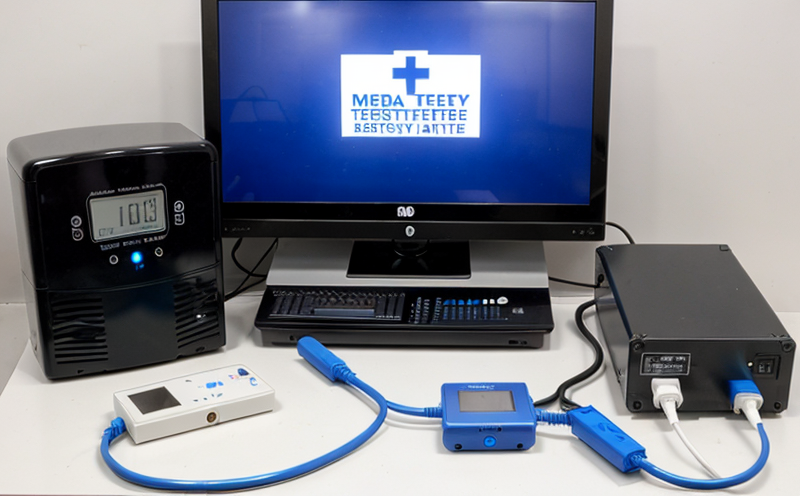GB/T 18287 Medical Device Lithium-Ion Battery Testing for Mobile Applications
The GB/T 18287 standard is essential for ensuring that medical device batteries meet the stringent safety and performance requirements demanded by regulatory bodies worldwide. This standard, developed specifically for lithium-ion (Li-ion) batteries used in mobile medical devices such as portable defibrillators, patient monitors, and other battery-powered equipment, addresses critical aspects of design, manufacturing, testing, and quality control.
Medical device manufacturers must adhere to this standard when developing Li-ion batteries intended for use in their products. The primary goal is to ensure that these batteries are reliable, safe, and capable of meeting the demanding operational requirements of medical devices. Compliance with GB/T 18287 not only helps in achieving regulatory approval but also ensures product safety and performance.
The standard covers various tests that evaluate battery performance under different conditions such as temperature cycling, charge-discharge cycling, overcharge protection, and thermal stability. These tests are designed to simulate real-world usage scenarios and ensure that the batteries can withstand extreme environmental conditions without compromising on performance or safety.
Manufacturers must perform these tests using specialized equipment tailored for medical device battery testing. This includes precise temperature control systems, charging stations capable of simulating various charge profiles, and sophisticated data logging software to capture test results accurately. The testing process is not only about passing the required parameters but also ensuring that the batteries meet specific performance criteria under different operating conditions.
For instance, during temperature cycling tests, the battery undergoes repeated exposure to extreme temperatures, including high heat and cold extremes, to assess its durability and reliability. Charge-discharge cycles test the battery's ability to retain capacity over time, which is crucial for maintaining consistent power output in medical devices. Overcharge protection ensures that the battery does not experience excessive voltage spikes during charging, preventing potential damage or safety hazards.
The standard also emphasizes the importance of accurate reporting and documentation throughout the testing process. This includes detailed records of test parameters, observed results, and any deviations from expected performance. Such comprehensive documentation is vital for regulatory compliance and troubleshooting issues that may arise during product development or field use.
Compliance with GB/T 18287 also involves regular calibration and maintenance of the testing equipment to ensure consistent and accurate results. This ensures that the tests conducted are reliable and reproducible, providing confidence in the quality and safety of the final products.
In summary, compliance with GB/T 18287 is crucial for ensuring that medical device batteries meet the highest standards of safety and performance. By adhering to this standard, manufacturers can produce reliable, safe, and high-quality Li-ion batteries that are essential components of modern medical devices.
Why It Matters
The importance of GB/T 18287 cannot be overstated for several reasons. First, it ensures the safety of patients who rely on these medical devices to monitor their health or provide critical care. By adhering to this standard, manufacturers can prevent potential hazards such as battery failure, overheating, and other safety risks.
Second, compliance with GB/T 18287 helps in achieving regulatory approval from relevant authorities worldwide. This is particularly important for international markets where stringent regulations are enforced. Meeting these standards not only facilitates market entry but also enhances the reputation of the manufacturer within the industry.
Third, adherence to this standard aids in maintaining consistent performance and reliability of medical devices over their entire lifecycle. This ensures that patients receive dependable care without interruptions caused by battery issues or other operational problems.
Lastly, compliance with GB/T 18287 promotes innovation and continuous improvement within the industry. By setting clear guidelines for testing and quality control, manufacturers can push the boundaries of what is possible in terms of battery technology and performance.
Applied Standards
| Standard Number | Description |
|---|---|
| GB/T 18287-2013 | Lithium-ion batteries for mobile medical devices - Safety and performance requirements. |
| IEC 62133 | Battery packs, battery cells, and battery chargers for portable information technology equipment - Safety specifications. |
| ASTM F3899-17 | Standard Guide for Evaluating Lithium-Ion Cells for Use in Mobile Medical Devices. |
The GB/T 18287 standard is closely aligned with other international standards such as IEC 62133 and ASTM F3899-17. These standards provide additional insights into the safety and performance requirements of lithium-ion batteries, complementing the specific focus of GB/T 18287 on mobile medical devices.
By adhering to these standards, manufacturers can ensure that their products meet not only local but also global regulatory requirements, thereby enhancing their marketability and reputation in the industry.
International Acceptance and Recognition
- The GB/T 18287 standard is widely recognized by major medical device manufacturers and regulatory bodies worldwide.
- It has been adopted as a model for other standards related to lithium-ion batteries in the healthcare sector.
- Many countries, including China, have implemented this standard domestically, ensuring that products meet international quality benchmarks.
- The standard is also accepted by global organizations such as the International Electrotechnical Commission (IEC) and the American Society for Testing and Materials (ASTM).
The wide acceptance of GB/T 18287 underscores its importance in ensuring consistent battery performance across different regions. This recognition enhances the trustworthiness of products compliant with this standard, making it easier for manufacturers to gain market entry and customer confidence.





